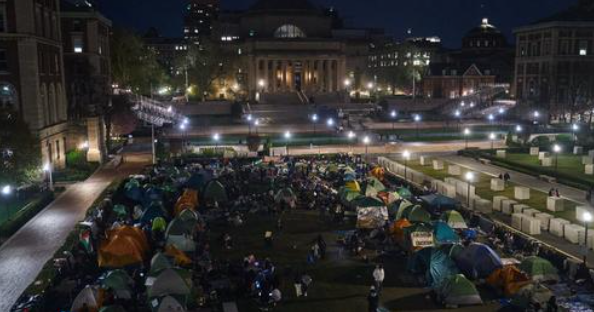Columbia University Shifts to Online Classes as Pro-Palestinian Protests Intensify; Yale Faces Turmoil with Riot Police Deployment Amid Pre-Passover Demonstrations
In a significant escalation of campus unrest, Columbia University has transitioned to online classes due to ongoing pro-Palestinian protests that have raised safety concerns among students. Concurrently, Yale University has witnessed the deployment of riot police as demonstrations become increasingly volatile ahead of the Passover holiday. These developments mark a dramatic rise in campus tensions at two of America’s most prestigious universities.
Columbia University: A Campus in Disarray
The decision by Columbia University to move classes online came after a series of pro-Palestinian protests intensified last week. The situation grew more complicated after university officials were called to testify before Congress concerning allegations of antisemitism and escalating tensions on campus.
The protests, which have included the setting up of encampments by pro-Palestinian students, have made some Jewish students feel unsafe, leading to heightened security concerns. The New York Police Department (NYPD) arrested around 100 students during these demonstrations. Despite the arrests, Police Chief John Chell noted that the students were peaceful, suggesting that the measures were precautionary rather than responsive to violent acts.
Amid these tensions, a rabbi affiliated with Columbia University advised nearly 300 Jewish students to leave the campus until the situation stabilized. This advice came just as Passover was about to begin, adding to the community’s anxiety. However, the Columbia/Barnard Hillel, a center for Jewish student life, countered this recommendation by advising Jewish students to remain on campus, indicating a divide in the community on how best to handle the situation.
Yale University: Escalating Protests and Police Response
At Yale University, the situation has also deteriorated, with at least 45 people arrested amid protests involving around 200 students. The university’s administration has warned of potential disciplinary actions in response to the protests, which have disrupted campus activities. Yale President Peter Salovey’s late Sunday email highlighted the administration’s concern and its readiness to enforce school policies rigorously.
The deployment of riot police at Yale underscores the seriousness of the unrest and the challenges facing the university in maintaining order while respecting students’ rights to express their views.
Background and Broader Context
The protests at Columbia and Yale are part of a larger pattern of demonstrations at universities across the United States, where issues of free speech, safety, and the complex dynamics of Middle Eastern politics frequently intersect. These protests often reflect broader societal tensions and are deeply influenced by international events.
At both universities, the immediate cause of the unrest was linked to the Israeli-Palestinian conflict, a perennially contentious issue on many campuses. At Columbia, the spark was a congressional hearing on antisemitism, which brought to the forefront longstanding concerns about the campus climate for Jewish students. At Yale, the trigger appears to have been a series of organized protests that rapidly gained momentum.
Reactions and Responses
The responses to the unrest have been varied. At Columbia, the administration’s decision to switch to online classes was primarily aimed at ensuring student safety and preventing further escalation. This move has been met with mixed reactions from the student body, with some supporting it as a necessary measure to safeguard vulnerable groups, while others view it as an overreaction that could stifle free expression.
At Yale, the use of riot police has been controversial. Critics argue that it represents a militarization of campus security that could intimidate students and suppress peaceful protests. Supporters of the action contend that it is a necessary response to a situation that could potentially become dangerous.
Looking Forward
As both universities grapple with these challenges, the focus is on finding a balance between ensuring security and respecting students’ rights to protest. The administrations of Columbia and Yale are under intense scrutiny regarding how they handle these incidents, which could have long-term implications for policies on campus protests and security.
The ongoing unrest is a reminder of the complexities involved in managing diverse and often divided university communities. It also highlights the broader societal divisions that can infiltrate academic settings, requiring administrators to navigate a delicate line between different factions and ideologies.
As the situation develops, both Columbia and Yale will continue to be tested on their ability to manage and mitigate conflict while fostering an environment conducive to learning and free expression. The outcomes of these tests could potentially set precedents for other institutions dealing with similar issues.


